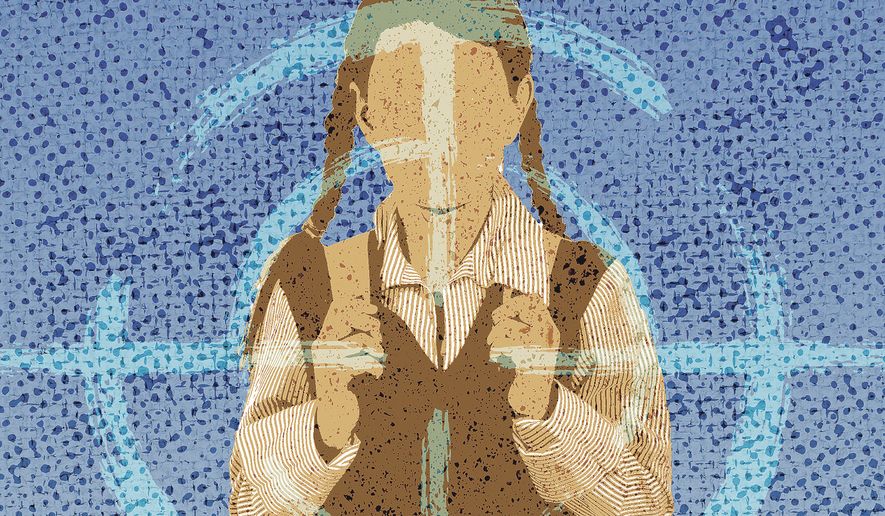OPINION:
On the starry night of April 13 in the Negev desert of southern Israel, Mohamed al-Hassouni, a Bedouin man, took shelter with his family under the moonlight of the Promised Land.
Mr. al-Hassouni’s Bedouin ancestors descended from a long line of nomadic Arabic tribes that originated in the Syrian desert and settled across the Middle East and Northern Africa. In his own journey, the 49-year-old father of 14 found work in an Israeli solar panel factory. His family settled in a small dwelling without electricity in an unrecognized village known as Al-Fura, just south of the town of Beer-Sheva, about 60 miles from Jerusalem.
That unforgettable night, when the Israeli government detected it was under attack, Jerusalem sounded alarms throughout the Promised Land to warn civilians to take cover. But like many other unrecognized desert villages, Al-Fura has no rocket shelters and is not shielded under Israel’s Iron Dome. The direct attack, the first in Iran’s history against Israel since the Iranian Revolution of 1979, was in response to a strike on a building near the Iranian Embassy in Damascus, Syria, that killed an Islamic Revolutionary Guard Corps’ Quds Force commander.
Mr. al-Hassouni was soon stunned as shrapnel from one of 350 Iranian missiles raining down on the desert invaded his home. “When it started, there were alarms and missiles,” he told the Jewish Chronicle in an April 16 interview. “One fell on our house and hit Amina on the head.”
Amina, one of Mr. al-Hassouni’s daughters, is an adorable 7-year-old Arabic-Bedouin schoolgirl with pigtails who, until Iran’s attack, enjoyed going to school and spending time with her siblings.
“Amina loves to dance, to sing, she’s never complained about anything,” Mr. al-Hassouni told the Chronicle. “She loves everything that her mother cooks for her. At school, she’s good at all the subjects. She’s just a regular little girl who loves life. … Amina is not connected to this chaos, she doesn’t know anything, she doesn’t understand politics and she should be left out of it.”
Mr. al-Hassouni frantically drove his car to nearby Arad, and Israel’s national emergency service took the little girl to an emergency room in Beer-Sheeva.
“She is in very serious condition. She went through two surgeries,” Mr. al-Hassouni told the Chronicle. “They told us to wait, so that’s what we are doing. We wait and pray all the time. … I am scared. One of my sons fell and was hurt in the stomach. He was bleeding, we also had to take him to see doctors, they gave him medication. He is with us now, but he still suffers.” A hospital spokesperson said that Amina’s life is still in danger from a severe head injury.
In a Sunday morning telephone call to Israel, Chronicle journalist Amelie Botbol told me that Mr. al-Hassouni’s family was homeless because his children were too afraid to return to their house, which was damaged in the missile strike. Mr. al-Hassouni is understandably worried about his family’s future, but Arad Mayor Yair Maayan assured me in a telephone interview that the Israeli government will help.
“They are Israeli citizens, and citizens get support when there is a military attack,” Mr. Maayan told me. “They will get compensation for their house, medical costs and money from the Ministry of Finance. During the Oct. 7 attack, there were hundreds of houses that were destroyed. Those families will get compensated, but it takes time.”
To date, the press has asserted that Iran’s attack did minimal harm. Summarizing an Israel Defense Forces update, ABC News reported that the attack resulted in only one Israeli casualty. CBS News headlined another Israeli report that there was “very little damage,” and NBC News ran a banner reading, “Iranian barrage of missiles and drones causes little damage.”
While the execution of Iran’s strike was indeed a tactical failure, the phrase “little damage” and the notion there was “only” one casualty is a perspective worlds apart from the fathomless pain Amina’s family feels as they watch their little girl suffer.
When I spoke to Arad’s mayor Sunday evening, he was driving to the hospital to see Amina and her family, describing them as his “neighbors” who live near the Iraqi border. “She woke up and opened her eyes, but she is still in a bad situation,” he told me. The following evening, Mr. Maayan took his wife and daughter to the hospital with him and messaged me with better news.
“She is much better now,” he wrote. “She started to walk.”
To help avoid future injuries, Mr. Maayan said his town has been inviting members of the Bedouin community to join them in their rocket shelters if Iran strikes again. Sadly for Amina, even if she recovers, she will most likely live with injuries from Iran’s attack for the rest of her life.
“What I truly want is for every child to be able to live their lives,” Amina’s heartbroken father told the Chronicle. “They are just children.”
Even when just one person suffers, a tragedy has occurred. This could not be truer than when a child like Amina is in pain and faces the prospect of losing her life. All the members of her family are victims of Iran’s cruel missile strike. Regardless of our ethnicity, nationality or religion, we should all pray for Amina and her family — and never forget the irreplaceable value of “only” one human life.
• Jeffrey Scott Shapiro is a former Washington prosecutor and senior U.S. official who now serves on the editorial board for The Washington Times.




Please read our comment policy before commenting.